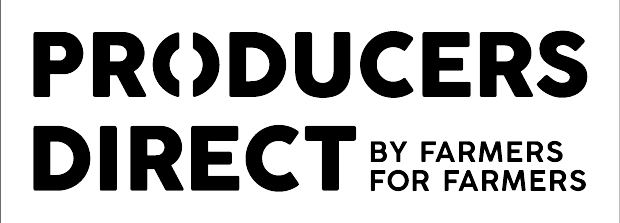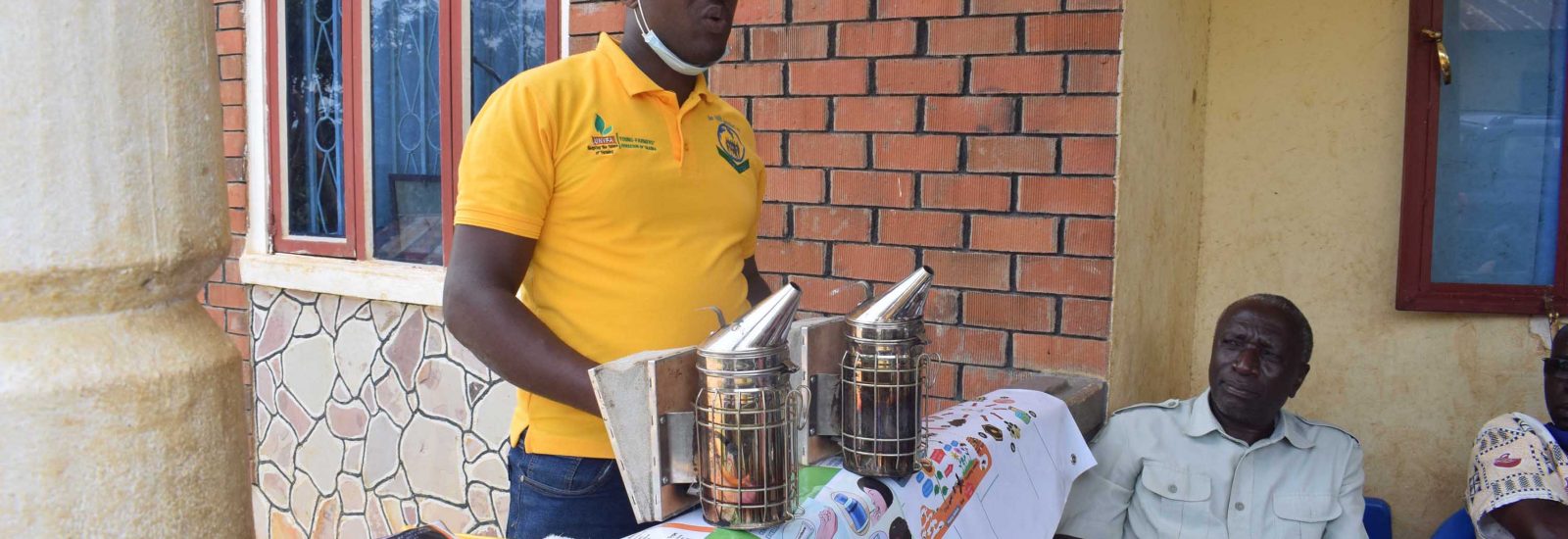Smallholder farmers in our network are organised into cooperatives or producer organisations which we refer to as Centres of Excellence (CoEs). Our CoEs are a farmer-run enterprise hosted by producer organisations. They support farmers through farmer-led training, funding through a farmer-led credit fund, market access, and farmers accessing applicable data to help them make better farming decisions. Through this model, we continue to grow thriving smallholder communities where each smallholder can realise their vision.
Agaba Keneth is a manager at one of our Centres of Excellence (CoE) – Kayonza, Uganda. Keneth has vast experience working with farmers and young people in Uganda and together with a team of youth agents, Keneth leads the day-to-day management at Kayonza. We spoke with Keneth who shared with us his experience working with smallholder farmers in Kayonza, the highlights of his work and the ways farmers can be supported to strengthen their enterprises and why more needs to be done to encourage youth participation in agriculture.
Take us through a day with you as a CoE manager.
I am a passionate farmer and enjoy learning about farming, sharing my experiences with farmers and anyone interested. I am keen to understand the impact we can make in our communities, especially in agriculture. I enjoy working with young people and I work closely with the farmers in my community every day to understand what they do, their challenges and how best to support them. I also like working with agriculture-related organisations that support smallholder farmers. I have previously worked with farmers in different communities as well as young farmers here in Uganda.
How many farmers are in your network in Kayonza?
Kayonza Growers Tea Factory has around 8,000 smallholder farmers, and we have around 3,000 smallholder farmers in our network. Some of these are part of the Youth Innovation Hub. They grow bananas, avocados, vegetables and do poultry keeping, dairy farming and beekeeping. There are also farmers who have ventured into value-added products like using bananas and pineapples to make wines.
Kayonza is mainly known for tea production, but farmers have begun introducing diversification products. Has this had an impact for the farmers?
Farmers have seen increased production because they’ve been applying a lot of the learning from the training sessions we have been having. They are selling more and adding a little more money into their pockets. Working with the youth agents has also been a great way to provide market access for these products. Through peer-to-peer learning, farmers can build a network of farmers they can learn from.
I’m also glad to see many more farmers in our network keeping records to help track the progress of their businesses. Another thing that has worked for us is our zonal groups. Grouping our farmers into zones has made training more structured and effective and we are able to monitor the progress and support the farmers more efficiently. The best thing about these zonal groups is that they were all created by the farmers. They mobilised amongst themselves and formed groups that work for them, and selected a committee that is responsible for ensuring the smooth running of all the activities of all the zones.
What challenges do smallholder farmers experience and in your opinion, what can be done to help break down these barriers?
Training is key. Farmers need information and skills about how best to use their land, how to make their farming a business and the many opportunities that exist and they can take advantage of. There are many subsistence farmers with big chunks of land that they can use to grow commercial crops and the thing standing between them and having these enterprises is a lack of training and skills. So in my opinion, this will be a good place to start.
We also have seen many farmers who have excess produce from their farms, but lack the markets where they can take their produce. For these farmers, we can help provide access to markets and for others like banana farmers, we can train them on the benefits of value addition.
Because of a combination of customs, policies and laws, young Ugandans are unable to own land. And getting parents, who are the land owners, to trust them with doing any kind of farming on their land is a challenge. And so, some young people lose interest in wanting to start something in agriculture. If young people could access land, they could earn a living from the industry.
From your own observation, what comes to the minds of young people when they think about agriculture as a profession? Do they see it as an area where they can make money?
In a country like Uganda, with a population of more than 48 million people, most of our food is produced by older farmers – our parents and grandparents who make sure that we have food every day. If you take a look at previous years, despite it being the backbone of our nation, agriculture hasn’t been the sector that attracts young people. But what’s exciting now is the innovations we are beginning to see in the sector. Young people are now getting interested in the modern forms of agriculture, opening up the opportunities for younger farmers to consider this as a field where they can get into and actually earn an income from.
For example, in the last five years, young people have ventured into a few areas across the agriculture value chain, like marketing and production. While acquiring land is still a challenge for most young people, a few farmers have started projects where they lease land to young people, where they can grow avocados. There are those who run their own micro- enterprises like pig farming, keeping goats, poultry, beekeeping and fish farming in small plots of land that do not require a lot of space. We have a Youth Innovation Hub in Kayonza where about 24 young people are doing commercial farming and they are also shareholders in our tea cooperative.
And what in your opinion can be done so that more young people can consider opportunities in agriculture?
I have been working with people for over 10 years now and throughout the years, we’ve tried different approaches to motivate young people to venture into the industry, and while some approaches have not worked and some have, I’ve learned a lot.
While lack of finance to start is a huge barrier preventing young people from wanting to consider a career in agriculture, I think we can first start by providing a platform where young people have a sense of belonging and they feel they can contribute. It is for this reason that we formed the Youth Innovation Hub in Kayonza. When young people came together to share ideas, we saw many more young people engage and that’s how all the micro-enterprises I’ve mentioned started.
My dream is to have an Africa Youth Innovation Hub, where young people from across Africa can showcase what they are doing in their countries, their innovations and inspire other young people like them. This way, we can learn about the gaps that exist and by working with young people, identify solutions that will enable the creation of more opportunities in the industry. If supported, young people can become successful agri-preneurs, designing innovations that will power the agriculture sector now and in future.
Tell us a little about your experience working with youth agents.
Working with youth agents has made it possible for us to reach many more farmers in a day. We are able to allocate tasks in a way that is efficient and allows us to best support our farmers. Right now we are able to monitor farmers’ activities and monitor their progress as well. Working with youth agents has made it possible to deliver on a lot of our projects in good time.
Our youth agents facilitate sales between farmers and buyers. Our goal was to ensure that the farmers in our network and the surrounding communities understand the value of our Centre of Excellence in enabling farmers to access markets, and youth agents have been our champions in driving market access and training farmers and buyers about how to navigate the platform. We are proud of the work they do every day.
Please share with us how farmers in Kayonza were affected by the pandemic and how they were able to cope during the difficult period.
Our farmers were not exempt from experiencing the negative effects of the pandemic. Because of the lockdown measures, everyone had to stay home, making it difficult for our farmers to sell their produce and even when they could, they sold at very low prices. Tea prices went down and farmers who depend on a single cash crop were greatly affected.
One of the ways that we worked together with farmers to reinforce the health measures from the government and to ensure that our farmers stayed safe and protected during the pandemic, was through sensitisation, using the training materials that farmers co-designed with the Producers Direct team.
We are grateful that things began picking up after the measures were lifted. As we speak, I am aware that there are some organisations that closed down during the pandemic and they have never reopened. And while some farmers are still paying some of the debts they incurred during that period, they are glad that things are slowly going back to normal.
We’ve seen how climate change is affecting the agricultural sector. How are you helping farmers in your network deal with these negative effects?
Climate change is a major challenge for farmers and they are noticing the negative effects too. One of the ways we are working with farmers is through reforestation. Farmers are planting trees and are learning about how to conserve natural forests. The introduction of diversification products has also greatly contributed to address food security.
Finally, what have been your highest and lowest moments working with smallholder farmers in Kayonza?
The pandemic was the lowest moment for me because everything was closed, farmers couldn’t sell their produce like they normally would and things were difficult for them.
Another low moment for me, which we are working on, is to increase the participation of female farmers. While we have female farmers in our network, their number is low when compared to that of men, and so one of my goals is to work closely with more female farmers to increase their participation and interest in agriculture.
Our youth agents love working with farmers. It is always great to see farmers learning from the trainings. The peer-to-peer training in the farmer demonstration sites has greatly contributed to farmers learning and putting into practice what they learn in their farms.
One of my highlights is whenever I see farmers working together during meetings and training on the demonstration sites. It always gives me joy because I know that they are not only learning directly, but that they are implementing what they are learning on their farms and in their agriculture enterprises.




